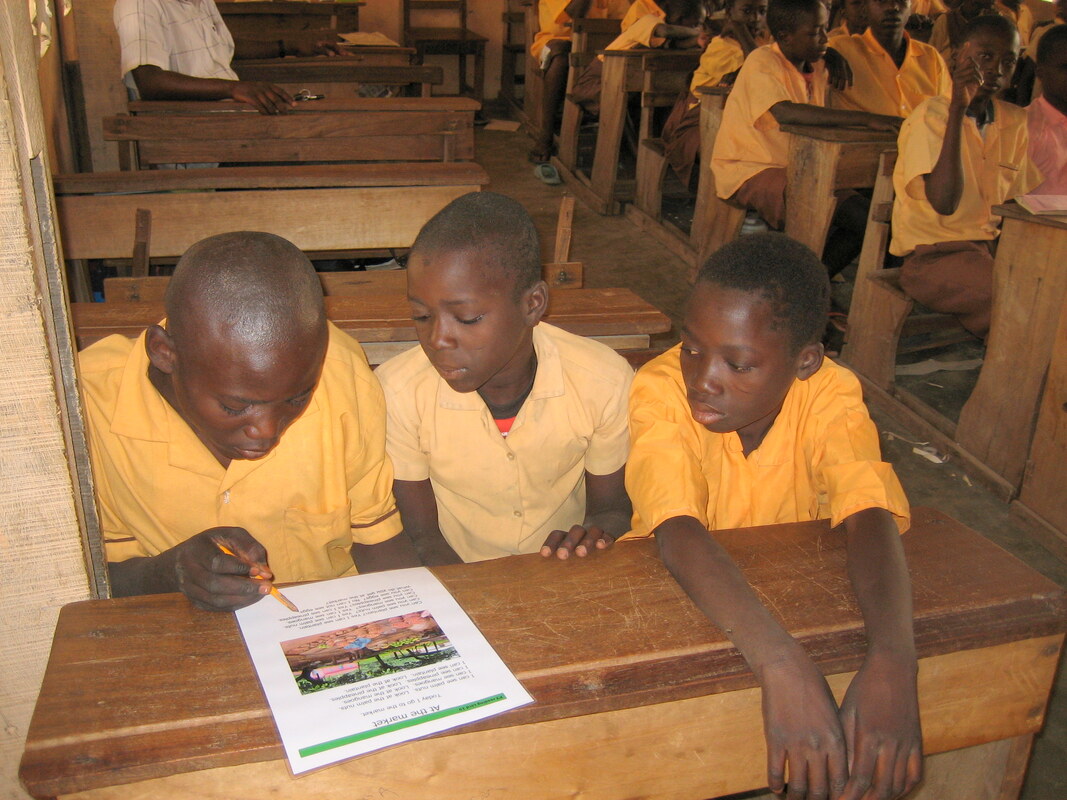Impact of the Let's Read programme
Context
Background
Literacy levels in the Upper East Region are some of the lowest in Ghana. Teaching tends to be didactic, reading materials are few and far between and often inappropriate in level and content. Teacher attendance is often poor, many teachers are unpaid and untrained volunteers. Learning conditions for some children are far from ideal.
“Consistently, research suggests that education and learning outcomes among Ghanaian children continue to be among the worst in the world: with less than 25% of Ghana’s Primary class 6 children able to read and attain basic literacy skills after 6 years of public schooling.” Tackling Education Needs Inclusively (TENI) Executive Summary, p6 2014
Background
Literacy levels in the Upper East Region are some of the lowest in Ghana. Teaching tends to be didactic, reading materials are few and far between and often inappropriate in level and content. Teacher attendance is often poor, many teachers are unpaid and untrained volunteers. Learning conditions for some children are far from ideal.
“Consistently, research suggests that education and learning outcomes among Ghanaian children continue to be among the worst in the world: with less than 25% of Ghana’s Primary class 6 children able to read and attain basic literacy skills after 6 years of public schooling.” Tackling Education Needs Inclusively (TENI) Executive Summary, p6 2014
Assessing impact
There are currently no national tests for primary schools in Ghana; schools set and mark their own termly tests. We have devised our own assessments based on the Ghanaian curriculum and what we cover in our workshops and school visits.
When we started our programme we tested children individually on their knowledge of basic phonics. As the project progressed we added simple reading and writing tasks. Each year we made these increasingly demanding and we now have tests which match, as far as possible, the expected standards of functional literacy for children in P6, the final year of primary education. Regardless of when schools joined the programme, we now assess all children at P6 levels. We also do sample checks during the year in lower primary classes. Teachers usually find these assessments useful. One head teacher said, "It keeps us on our toes, knowing you are coming!"
There are currently no national tests for primary schools in Ghana; schools set and mark their own termly tests. We have devised our own assessments based on the Ghanaian curriculum and what we cover in our workshops and school visits.
When we started our programme we tested children individually on their knowledge of basic phonics. As the project progressed we added simple reading and writing tasks. Each year we made these increasingly demanding and we now have tests which match, as far as possible, the expected standards of functional literacy for children in P6, the final year of primary education. Regardless of when schools joined the programme, we now assess all children at P6 levels. We also do sample checks during the year in lower primary classes. Teachers usually find these assessments useful. One head teacher said, "It keeps us on our toes, knowing you are coming!"

It is not easy to get an accurate picture of how much reading has improved in the schools using the Let's Read programme.
Measuring progress
Without a national testing system we have to use as many indicators of progress, or otherwise, that are available. These include:
Findings
We have seen year on year improved scores in reading/writing assessments:
- Classes are sometimes very crowded and teachers are not able to ensure children do not copy each other.
- In some schools attendance is poor especially during key farming seasons.
- Teachers sometimes feel they should help children to get the right answers. Testing is often seen as a way of criticising their teaching.
- A system of transferring teachers and headteachers means that trained teachers can be moved to schools not using the LR programme and vice versa so assessment results can be inconsistent.
- A number of other literacy programmes have been delivered in the area in the last few years since we set up Let's Read so it is not possible to identify the impact of an individual programme.
Measuring progress
Without a national testing system we have to use as many indicators of progress, or otherwise, that are available. These include:
- our own observations
- discussions with teachers and circuit supervisors
- results of our assessments
- observations and feedback from other people.
Findings
We have seen year on year improved scores in reading/writing assessments:
- There has been a steady improvement in assessment scores across all groups, although individual schools can vary from year to year
- Teachers are generally enthusiastic about using Let's Read and many say they enjoy teaching more
- Heads say attendance has improved because children find school more interesting
- Teachers say they can see the difference in the achievement of children taught with Let's Read methods
- The books and materials are welcomed by schools with few resources
- Where there is commitment to Let's Read by teachers and headteachers, size of class or school, provision of resources and even a lack of trained teachers do not prevent children from improving literacy scores.
More details of assessments and reports gathered over the period of the programme can be found on our Reports and Evaluation page.


